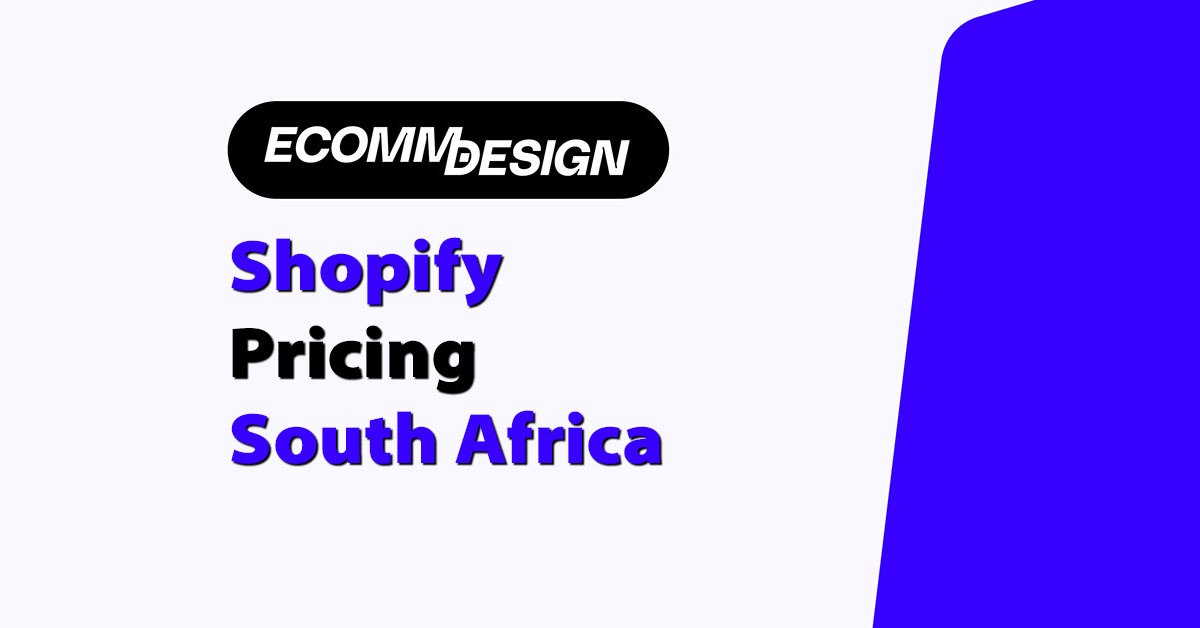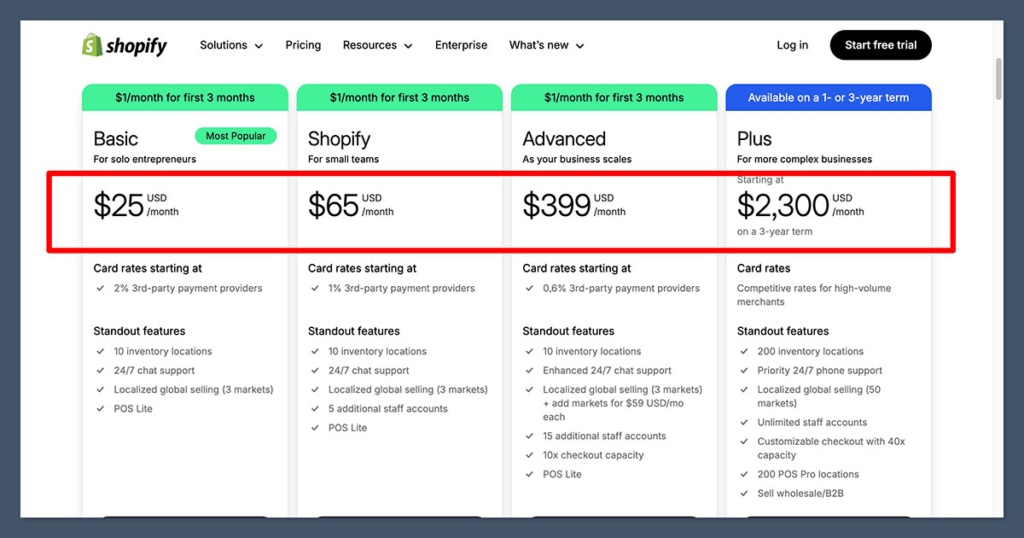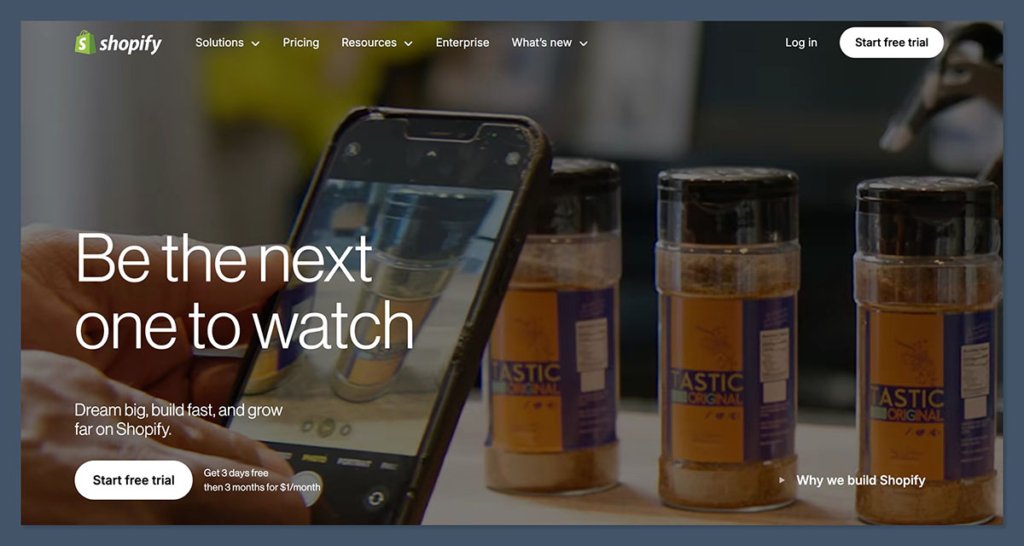
Shopify isn’t just my personal, favorite ecommerce platforms – it’s easily one of the most popular platforms worldwide.
If you’re an ecommerce merchant based in South Africa, Shopify can offer all the tools you need to run a thriving store.
In fact, there are more than 17,000 live Shopify stores based in South Africa right now – showing just how popular the ecosystem is.
However, to make sure you’re getting the best value for your money when investing in Shopify, you first need to decide which plan you’re going to choose.
That can be easier said than done, because when it comes to Shopify Pricing, South African merchants typically have limited information.
If you visit Shopify’s official website, you’ll see the prices outlined in USD, not ZAR – which can make it tougher to make an informed decision.
Fortunately, I’m here to help.
Here’s your guide to all of the Shopify plans, what they actually cost, and how you can figure out which is best for you.
Shopify Pricing South Africa: The Plan Overview

The first thing you need to know is that there are actually various different plans available to South African Shopify merchants.
In this guide, I’m going to ignore two options: Starter, and Retail, for a few reasons.
The Starter plan ($5 or around 92 ZAR per month), really only gives you tools for selling through an existing website, social media, or messaging apps – it’s not a great choice if you’re looking to build a new website or develop a strong brand.
The Retail plan ($89 or 1638 ZAR per month) is really just for companies interested in using Shopify’s POS system – and for this guide, I’m focusing on ecommerce merchants – rather than companies that primarily sell products “offline”.
So, with those two options out of the way, we’re left with four core options.
Keep in mind the ZAR prices are based on current exchange rates (at the time of writing), so they may vary slightly.
| Basic | Shopify | Advanced | Plus | |
|---|---|---|---|---|
| Monthly fee | $25 (approx. 460 ZAR) | $65 (approx. 1197 ZAR) | $399 (approx. 7347 ZAR) | Starting at $2,300 per month (approx. 42355 ZAR) |
| Annual fee | $19 (approx. 350 ZAR) | $49 (approx. 902 ZAR) | $299 (approx. 5506 ZAR) | Starting at $2,300 per month (approx. 42355 ZAR) |
| Transaction fees (applicable for third-party processors) | 2% | 1% | 0.6% | Custom |
Notably, you can also access Shopify for free with a 3-day free trial.
That might not sound like it gives you a lot of time to experiment with Shopify’s features. But currently, you can extend your trial (with certain plans), and pay just $1 (approx. 18 ZAR) per month for the first three months.
Shopify Pricing in South Africa: Which Plan to Choose
So, which plan should you pick for your ecommerce store?
It really all depends on the size of your business, and the specific features you’re looking for.
All of the core Shopify plans come with the basic features you need to run a successful store – but each higher-tier plan comes with its own specific benefits.
Let’s dive into each of your options.
The Shopify Basic Plan: For Solo Sellers
Price: $19 per month (approx. 350 ZAR) paid annually
Skipping the Starter plan entirely – since it doesn’t give you any actual website building features, let’s dive straight into the Shopify Basic plan.
This is generally the first plan I’d recommend to solo entrepreneurs – small sellers just getting started in ecommerce.
If you’re launching a new business, or side hustle as a South African merchant, the Basic plan gives you all the tools to build a fully-fledged online store, with 10 inventory locations, basic analytics and reporting tools, themes, automation tools, and more.
You don’t get any additional staff accounts with this plan (though collaborator accounts are available). However, you do get:
- Shipping discounts of up to 44.2%
- Shipping labels
- 24/7 live chat support
- A free SSL certificate
- Unlimited products
- Unlimited contacts
- Customer segmentation tools
- Gift cards and discount codes
- Unlimited web hosting
- Shopify POS Lite
- Shopify Inbox, Forms, and Emails
- Abandoned checkout recovery
- Fraud analysis
- Shopify Marketplace Connect
- 3 Local Markets
- Standard API limits
Keep in mind, if you use a third-party payment processor there’s a 2% transaction fee too.
Who is Shopify Basic Best For?
I’d advise using the Shopify Basic plan if you’re a solo entrepreneur in search of straightforward, and powerful ecommerce tools.
It’s relatively cost-effective, particularly if you pay annually, and you get some bonus features other platforms miss, like abandoned cart recovery.
However, this might not be the ideal plan for you if you need multiple staff accounts.
The Shopify Plan: The Standard SMB Option
Price: $49 per month (approx. 902 ZAR) paid annually
Shopify is basically the “standard” plan on Shopify, intended for smaller businesses with limited teams.
It’s not all that different from the Basic plan in a lot of ways. Most of the features are exactly the same, the main difference is you can “share the load” with more team members.
You get 5 staff accounts on the Shopify plan, as well as a couple of extra bonuses like:
- Third-party transaction fees of 1%
- Full data access for custom apps
- Slightly enhanced reports
- Options for additional shipping discounts
The difference in cost between Shopify Basic and Shopify is pretty significant – but it might be worthwhile if you need to bring multiple team members on board.
Who is Shopify Best For?
Ultimately, Shopify is the best pick for smaller ecommerce merchants in South Africa who don’t have a lot of needs for advanced features, but do have multiple team members.
If you’re just starting to grow, and you need more staff accounts, and lower transaction fees, this is a good pick.
The Shopify Advanced Plan: For Scaling Brands
Price: $299 per month (approx. 5506 ZAR) paid annually
The Advanced plan is where Shopify starts really adding some pretty distinct benefits for scaling business owners – those that want to turbocharge their online growth.
It’s not as mind-blowing as the enterprise plan (but it is a lot cheaper). However, it does come with a lot of great features.
On top of everything you get in the “Shopify” plan, you’ll also receive:
- 15 staff accounts for larger teams
- Lower transaction fees (0.6%)
- Lower credit card rates
- Enhanced 24/7 support
- Duties and import tax tools
- Options for additional Shopify markets
- Up to 2x higher API rate limits
- 10x checkout capacity
As your company begins to grow, this plan really gives you everything you need to start organizing your team, and increasing profits.
Who is Shopify Advanced Best For?
I’d suggest using Shopify Advanced if you’re ready to scale your business.
If you’re expanding your team, and moving into new markets or geographies, this is a fantastic plan.
It’s actually really good value for money too, when you consider all the features you’re getting.
The Shopify Plus Plan: Built for Enterprises
Price: Starting at $2,300 per month (approx. 42355 ZAR)
Shopify Plus is Shopify’s dedicated enterprise plan.
It’s your all-access pass to everything Shopify has to offer, giving you the freedom to grow into a major ecommerce leader.
Notably, this plan is only available on a three-year term – so it’s not great for small businesses still unsure about the longevity of their store – or how well it will grow going forward.
With this plan, you get unlimited staff accounts, as well as:
- 200 inventory locations
- Priority support live chat or phone support
- Transaction fees of 0.2%
- 40 x checkout capacity
- 20 locations for Shopify POS Pro
- Up to 10x API rate limits
- 25 headless storefronts
- 50 international markets
- 9 free expansion stores
- A customizable checkout
- B2B and wholesale selling
- Bot protection
- Exclusive API access and endpoints
- Early feature access
- Launchpad promotions
- Custom apps with Shopify functions
- Custom user groups
- Shopify app partner access
- Complete access to Shopify Plus Academy
Notably, the overall price you pay will depend on the exact features you need – so make sure you reach out to Shopify for a custom quote.
Who is Shopify Plus Best For?
Shopify Plus is really only a plan I would recommend to huge companies – those earning millions in revenue per year.
Although it’s packed with advanced features, it can be very expensive, so you really need to ensure you’re bringing in the right number of sales.
Additional Shopify Costs for South African Merchants

One of the key things to keep in mind when you’re choosing a Shopify plan is there may be extra fees to consider.
For instance, there are transaction and credit card processing fees on all plans.
You can could sidestep the transaction fees by using Shopify Payments – Shopify’s proprietary payment processor – but this currently isn’t available in South Africa.
That could change in the future, as Shopify is gradually rolling the service out to different countries. For now, however, you’ll have to rely on a third-party solution.
Other fees to keep in mind include costs for:
- Apps: Shopify gives merchants access to thousands of great apps they can use to enhance their store’s functionality. While some apps are free, most have a one-time or monthly cost.
- Themes: There are free themes available to use with Shopify, but the premium themes with bonus features and design tools come with an extra cost.
- Domain names: Shopify will give you hosting and an SSL certificate with your plan, but you’ll need to pay for a custom domain yourself.
Plus, you might need to think about things like whether you’re going to pay for expert support with design, store maintenance, and marketing, or whether you’ll have to pay employee salaries.
Additionally, taxes aren’t included in the listed prices– so you’ll have to factor those in too.
My advice is to try and keep costs low by picking an annual plan (for extra discounts), and using free themes and apps when possible.
Make sure you assess your payment processor options carefully too – as that could save you a little extra cash.
Shopify Pricing in South Africa: Making Your Choice
Ultimately, there’s no one-size-fits-all strategy to choosing the right Shopify pricing plan.
For most solo entrepreneurs, I’d recommend getting started with Shopify Basic, and upgrading as necessary.
However, if you’re running a bigger business, or want to scale fast, you might want to consider Shopify, or Shopify Advanced.
Generally, though, you won’t need to think about Shopify Plus until you’re earning some serious revenue.
When that happens, upgrading to the enterprise plan will give you some brilliant features you can use to take your profits to the next level



